Buying medication online sounds convenient-until you realize how many fake websites are out there. In 2023, the FDA estimated that 96% of online pharmacies are illegal. These sites sell fake, expired, or toxic drugs that can hurt or kill you. A 2022 Consumer Reports investigation found people received Viagra with three times the active ingredient listed on the label. Another 1,842 adverse events tied to online pharmacy purchases were reported to the FDA that same year. The good news? Safe, licensed online pharmacies exist. You just need to know how to find them.
What Makes an Online Pharmacy Legitimate?
A legitimate online pharmacy doesn’t just look professional-it follows strict rules. These pharmacies are licensed by state boards of pharmacy, require a valid prescription from a licensed doctor, and have real pharmacists on staff to answer your questions. They don’t sell controlled substances like opioids or sedatives without a prescription. And they never ship medications without verifying your prescription first.The most trusted sign of legitimacy is the VIPPS seal from the National Association of Boards of Pharmacy (NABP). To earn this seal, pharmacies must pass 17 requirements covering everything from how they store drugs to how they protect your personal data. As of October 2023, only 68 U.S. pharmacies held this accreditation. That’s not many-but it’s a reliable list.
Another reliable marker is the .pharmacy domain. Unlike .com or .net sites, only pharmacies that prove they’re licensed can use this web address. If a site claims to be Canadian but ends in .pharmacy, you can check its license status through the NABP’s official directory. Many fake sites copy the VIPPS seal or use fake .pharmacy domains, so always verify directly through the NABP website-not by clicking a button on the pharmacy’s page.
How to Verify a Pharmacy Before You Buy
Don’t skip these five steps. Each one catches different types of fraud.- Check for a prescription requirement. Legit pharmacies won’t let you buy prescription drugs without a valid, up-to-date prescription from a U.S.-licensed doctor. If the site offers “no prescription needed” or “instant approval,” walk away.
- Find a physical address and phone number. Look for a real street address-not a P.O. box. Call the number. If no one answers, or you get a voicemail from a foreign country, that’s a red flag.
- Verify state licensing. Go to the FDA’s BeSafeRx tool. Enter the pharmacy’s name or address. It cross-checks with state pharmacy boards. If it doesn’t show up, it’s not licensed in the U.S.
- Confirm pharmacist availability. Legit pharmacies have licensed pharmacists available by phone or chat. Ask a question about your medication. If they can’t answer, or reply with a script, it’s suspicious.
- Check payment methods. Safe pharmacies accept credit cards, debit cards, or PayPal. They avoid wire transfers, cryptocurrency, or money orders. Why? These methods are untraceable-and criminals love them.
Some sites even fake the VIPPS seal. One user in Ohio received a shipment of blood pressure pills from a site that looked exactly like a real pharmacy-right down to the seal. But when he checked the NABP’s Safe Site Search Tool, the pharmacy wasn’t listed. The pills were counterfeit. He ended up in the ER.
Canadian Pharmacies: A Common Trap
Many people turn to Canadian pharmacies because they assume they’re cheaper and safer. But here’s the truth: 42% of websites claiming to be Canadian pharmacies in 2022 were actually operating from other countries, including China and India. They use fake Canadian addresses and logos to trick you.To verify a Canadian pharmacy, you need to do two things:
- Check the province’s pharmacy regulatory body. For example, if the pharmacy claims to be in Ontario, go to the Ontario College of Pharmacists website and search for the business name.
- Look for the NABP Healthcare Merchant Accreditation. This is separate from the VIPPS seal and confirms the pharmacy has been audited by a U.S.-based organization.
Don’t trust the “Canadian Pharmacy” label on the homepage. Scammers design these sites to look official. Only trust what you find on official government or NABP sites.
What About PharmacyChecker?
PharmacyChecker is a third-party verification service that started in 2003. Back then, only half of the online pharmacies they checked met basic safety standards. Today, they audit over 80 points: license verification, prescription checks, privacy policies, SSL encryption, and even mystery shopping visits.They don’t just check paperwork-they send people to order drugs anonymously. If the pharmacy doesn’t require a prescription, or ships expired pills, they get removed from the list. As of 2023, PharmacyChecker lists over 200 accredited pharmacies worldwide, including many in Canada and the U.K.
But here’s the catch: PharmacyChecker doesn’t cover all U.S. pharmacies. Some VIPPS-accredited sites aren’t on their list. That’s why you should always cross-check with the NABP’s Safe Site Search Tool. Use both resources together for the safest results.
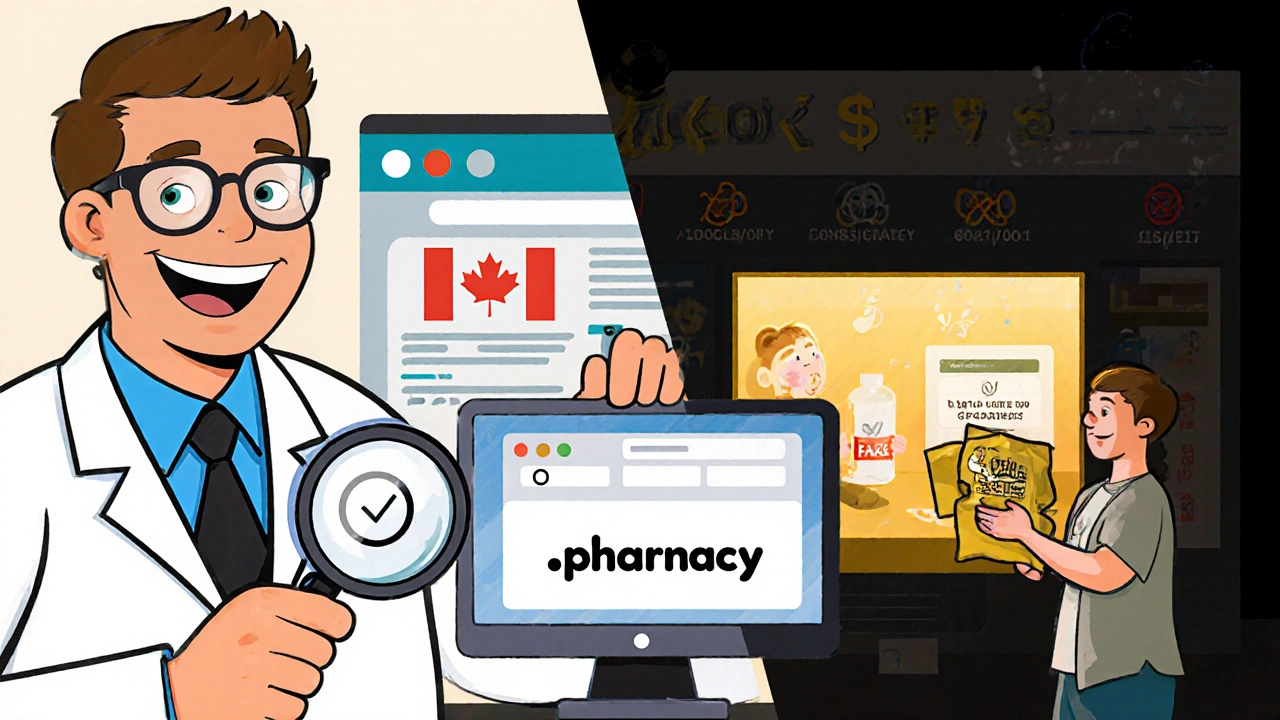
What Medications Can You Buy Online?
Not all drugs are safe to order online-even from licensed pharmacies. Controlled substances like opioids, benzodiazepines, and stimulants are rarely shipped by mail due to federal restrictions. Temperature-sensitive drugs like insulin or injectables also carry higher risks. Some pharmacies exclude them from their offerings.Most licensed online pharmacies focus on chronic condition medications: high blood pressure, cholesterol, diabetes, thyroid, and antidepressants. These are stable, long-term prescriptions with low risk of misuse. If a site offers rare or experimental drugs, or claims to sell “cures” for cancer or Alzheimer’s, it’s a scam.
PharmacyChecker and VIPPS both exclude certain drug categories from their lists. That’s not a limitation-it’s a safety feature.
Red Flags You Can’t Ignore
Here’s what to watch for:- No physical address or phone number
- Prices that are 70%+ cheaper than U.S. pharmacies
- Automatic refills without doctor approval
- Spelling errors, broken English, or unprofessional design
- Pop-up ads or redirects to other sites
- “Free shipping” with no return policy
- Claims like “FDA-approved” or “guaranteed results”
Legit pharmacies don’t make bold promises. They follow the law. If it sounds too good to be true, it is.
Why This Matters: Real Consequences
Counterfeit drugs aren’t just ineffective-they’re dangerous. In 2021, a man in Texas bought “generic Cialis” from a fake site. The pills contained a toxic industrial chemical used in paint thinner. He spent two weeks in the hospital. His story isn’t rare.According to NIH research, only 6% of illegal online pharmacies meet even basic safety standards. That means 94% of the sites you might stumble on could be putting your life at risk. The FDA has issued over 1,200 warnings about fake online pharmacies since 2020.
And it’s not just about pills. Fake online pharmacies steal your credit card info, identity, and medical history. One patient in Florida had her entire medical record sold on the dark web after ordering from a site that looked legitimate.
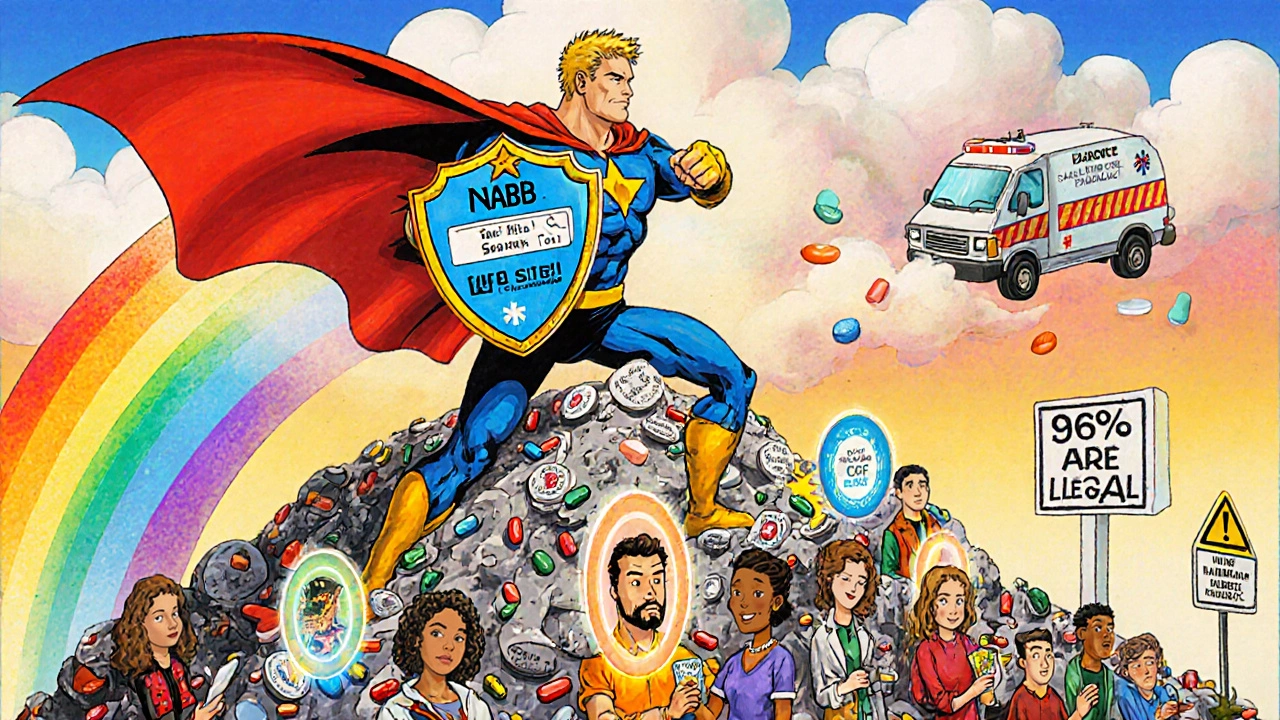
What to Do If You’ve Already Bought from a Fake Site
If you suspect you’ve purchased from a fraudulent pharmacy:- Stop taking the medication immediately.
- Contact your doctor or pharmacist to report what you took.
- Call the FDA’s MedWatch hotline at 1-800-FDA-1088.
- Report the site to the FTC at ReportFraud.ftc.gov.
- Monitor your bank statements and credit report for fraud.
Don’t wait. Even if you feel fine, some counterfeit drugs cause damage over time. Your body might not show symptoms right away.
Where to Find Verified Pharmacies
Here are the only three trusted places to find safe online pharmacies:- NABP’s Safe Site Search Tool - Lists all VIPPS-accredited pharmacies. Updated daily.
- PharmacyChecker.com - Lists accredited international and U.S. pharmacies with detailed audit results.
- Your insurance provider’s mail-order pharmacy - Most major insurers (like CVS Caremark, Express Scripts, or OptumRx) run their own licensed, in-network pharmacies.
Never use Google or Bing to search for “cheap Viagra online.” That’s how scams find you. Use these trusted sources instead.
Final Tip: Trust Your Instincts
If a website feels off, it probably is. Legit pharmacies don’t need to shout. They don’t use flashy banners or fake testimonials. They answer your questions calmly, clearly, and with evidence.When in doubt, call your local pharmacist. They know which online services are safe. Most will even help you verify a site for free.
Buying medication online doesn’t have to be risky. You just need to be smart. Take 10 minutes to verify a pharmacy before you click “buy.” That’s all it takes to protect your health-and your life.
How can I tell if an online pharmacy is licensed in the U.S.?
Check the NABP’s Safe Site Search Tool at nabp.pharmacy. Enter the pharmacy’s name or website. If it appears with a VIPPS seal, it’s licensed and accredited. Also, verify the physical address and phone number match state pharmacy board records using the FDA’s BeSafeRx tool.
Are Canadian online pharmacies always safe?
No. Many websites claim to be Canadian but operate from other countries. To verify, check the pharmacy’s license with the province’s pharmacy regulatory body (like the Ontario College of Pharmacists) and confirm they have NABP Healthcare Merchant Accreditation. Don’t trust logos or claims on the website.
Can I buy prescription drugs without a prescription from a licensed pharmacy?
No. Legitimate licensed pharmacies, whether in the U.S. or abroad, require a valid prescription from a licensed healthcare provider. Any site offering drugs without a prescription is illegal and unsafe.
What payment methods should I avoid?
Avoid wire transfers, cryptocurrency, money orders, or prepaid cards. Legitimate pharmacies accept credit cards, debit cards, or secure payment platforms like PayPal. These methods offer fraud protection and are traceable.
What should I do if I received fake medication?
Stop taking the medication. Contact your doctor or pharmacist immediately. Report the pharmacy to the FDA at 1-800-FDA-1088 and file a complaint with the FTC at ReportFraud.ftc.gov. Keep the packaging and pills as evidence.
Do licensed online pharmacies offer the same prices as local pharmacies?
Sometimes, but not always. Prices vary based on the pharmacy, insurance, and medication. Be suspicious if prices are 50% or more lower than your local pharmacy. That’s often a sign of counterfeit or expired drugs. Always compare prices using verified sources, not random search results.

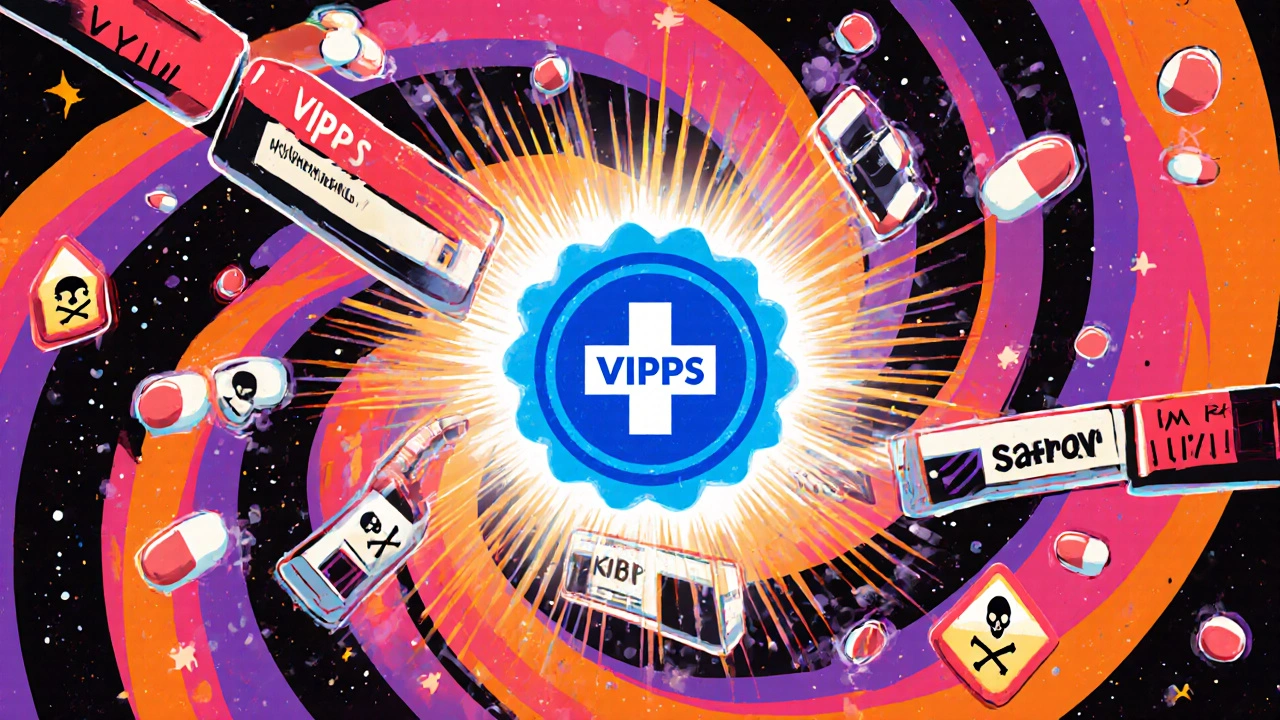
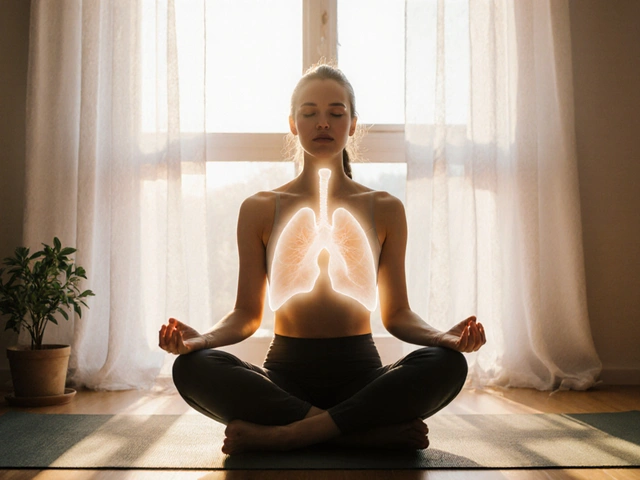
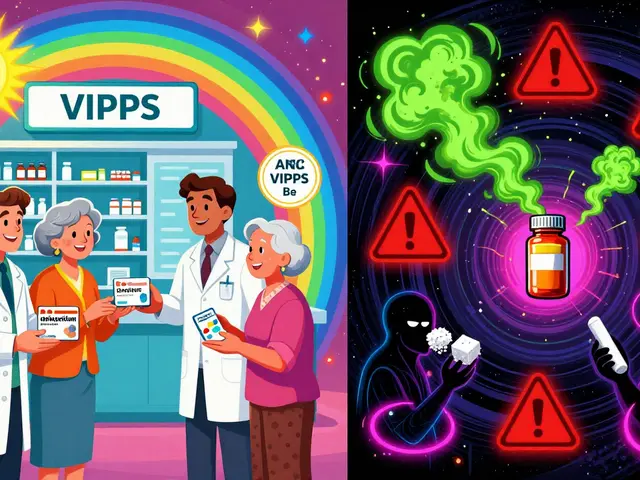

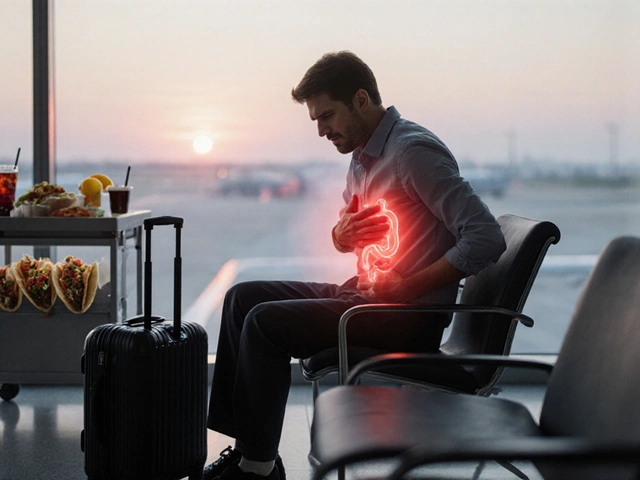
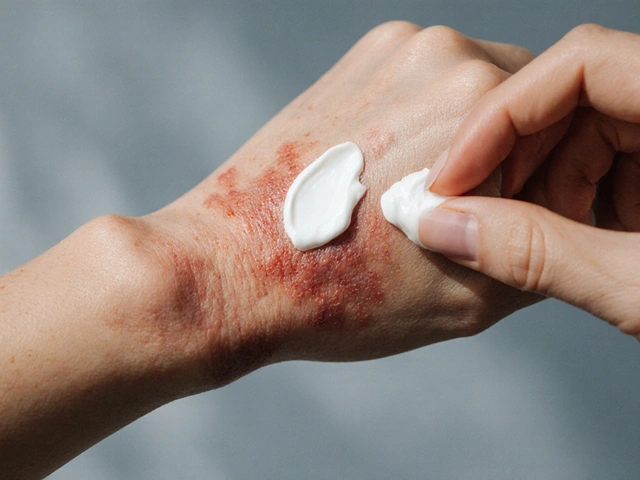
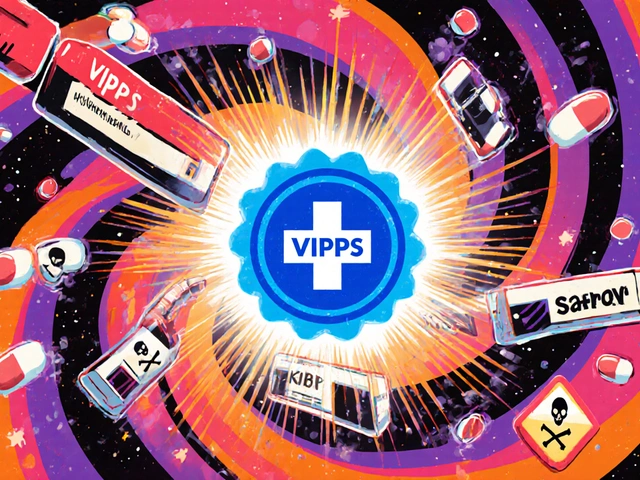
November 27, 2025 AT 05:36
Deirdre Wilson
So many sites look legit but are just fancy scams. I once bought 'generic' blood pressure meds and they tasted like chalk. Never again. Always check NABP.
November 28, 2025 AT 11:36
Wendy Edwards
i just learned about vipps last week after my aunt got sick from some 'canadian' pills she ordered. now she only uses her insurance's mail-order. so glad this post exists. pls share it with everyone u know.
November 29, 2025 AT 10:43
Ryan C
Actually, PharmacyChecker isn't as rigorous as you think. They accept some pharmacies that fail the NABP's 17-point audit. Also, .pharmacy domains can be spoofed via IDN homograph attacks - check the Unicode encoding. 🛑
November 29, 2025 AT 14:06
Cynthia Boen
This is such a long, boring lecture. Can't we just have cheaper meds without all this red tape? I don't care if it's 'illegal' if it works.
November 30, 2025 AT 18:25
Amanda Meyer
While I appreciate the intent behind this guide, I'm concerned about the implicit assumption that all non-VIPPS pharmacies are dangerous. Many international pharmacies operate ethically under different regulatory frameworks. Dismissing them entirely risks denying access to life-saving medication for those who can't afford U.S. prices. We need nuance, not fear.
December 1, 2025 AT 04:36
Gina Banh
Don't forget: if a pharmacy doesn't let you speak to a real pharmacist, it's a ghost store. I called one once - got a bot that said 'your order is processed' in broken English. Walked away. Saved my life.
December 3, 2025 AT 01:24
Dan Rua
Good stuff. I've been using PharmacyChecker for years and always cross-check with NABP. Best combo. 👍
December 4, 2025 AT 04:20
Damon Stangherlin
Just wanted to say thank you for this. My mom was about to order from a site that looked perfect - same logo, same colors. I caught it because of the 'free shipping' with no return policy. She's fine now. You saved her.
December 4, 2025 AT 21:25
Stephanie Deschenes
One thing people forget: if the pharmacy doesn't ask for your doctor's info or let you upload a prescription, it's a scam. I used to work in pharmacy tech - we had to verify every script manually. No exceptions. If they skip that step, they're not a pharmacy - they're a front.
December 6, 2025 AT 11:59
Jaspreet Kaur
Life is short but meds are forever. Don't gamble with your health for a few bucks. The real cost isn't the price tag - it's the ER bill, the lost time, the fear. Choose slow truth over fast lies. 🌱